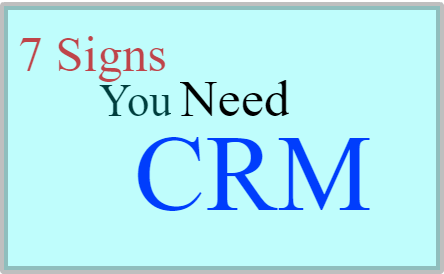 Is your business feeling the data pinch? Most small business owners tracking their customer information start with old and isolated tools. It’s not uncommon for owners to manager their business in email or spreadsheets.
Is your business feeling the data pinch? Most small business owners tracking their customer information start with old and isolated tools. It’s not uncommon for owners to manager their business in email or spreadsheets.
This makes sense when you first start out and your available budget is small. These tools are often very familiar and therefore easy to get started and use. As your business grows both in customer size and employee count, these tools become cumbersome and risky. With more employees entering and sharing information, the data can easily get lost, outdated, or – worse – segregated between teams.
Tracking sales, service, and other business functions is still a very important to support your continued success. How do you know you need a CRM System?
7 Signs Your Business Is Ready For a CRM
1. You have multiple spreadsheets shared across employees
When you’re passing multiple spreadsheets to get updates you have to expend effort on maintaining versioning. With several spreadsheets in use, your team lacks the benefit of a single view for your business information. You can mitigate this a little with the use of cloud spreadsheets – like Google Sheets. You still have issues with multiple people updating information at the same time.
2. You’re missing customer history
So you’re getting updates, but are you saving the historical information? Are past details overwritten with the latest update? Many systems do not have a good way to capture notes and conversations for the life-cycle of your customers. The history of your customer can help identify possible up-selling opportunities in the future.
3. You’re missing critical follow-ups on deals
One downside with using email and spreadsheets is the difficulty in setting reminders for those critical follow-ups. This is manageable with using calendar or outlook reminders when you’re a very small team. The larger the team the easier it becomes to have these get lost. Worse, spreadsheets and calendars isolate follow-ups’ statuses from each other. You lose the inability to get a quick overview of the activity with your customers.
4. You’re data spreads across multiple systems
It’s pretty common for companies to have multiple spreadsheets. You could have for current customers, prospects, customer service, marketing, or you could be using different system for each function. This siloed information requires you to look across multiple locations to get an overview of your business. You could spent time on running your business instead of losing due to your lack of a single-reference point.
5. You have conflicting information
Conflicting and inaccurate information can have dramatic negative impact on your business. Without a good method of tracking history of your business’ information, you lose the capability to know what is the latest and correct information on your business. You and your team can be making critical business decisions based on incorrect information. At best, this leads to making you look disorganized to your prospects and customers. At worst, it lead to lost deals.
6. Your team is duplicating work
Without a single reference point, strict process and communications is force upon your team, or risk duplicating work. Ever have a customer get contacted by more than one person for the same reason, on the same day? The lack a visibility between employees will lead to loss time and money due to the inefficiency.
7. You have a security issue
It is important for your business to protect a source of truth. Spreadsheets can easily get deleted, copied, and shared without anyone knowing. Even with rigorous backup processes you risk your critical business data being lost forever.
Set yourself up for success
Your small business won’t stay small for long. Working only in email and spreadsheets is not a scalable solution for long-term success. A custom relationship management (CRM) system provides a strong base for your business. A flexible CRM platform, like salesforce.com, can help with everything from managing sales, service, marketing, and even other business processes like time and expense tracking.
Interested in learning more about how salesforce can help you succeed? We’ll be happy to talk with you. Hope you enjoyed our 7 Signs Your Business Is Ready for a CRM blog post. Here are a few more you may be interested in:
- 6 Reasons to Integrate Autoquotes with Salesforce
- One Simple Way to Start Optimizing Salesforce
- See what our customer say about us
- Top 5 Ways to Unleash Your Sales Operations Potential with Salesforce







